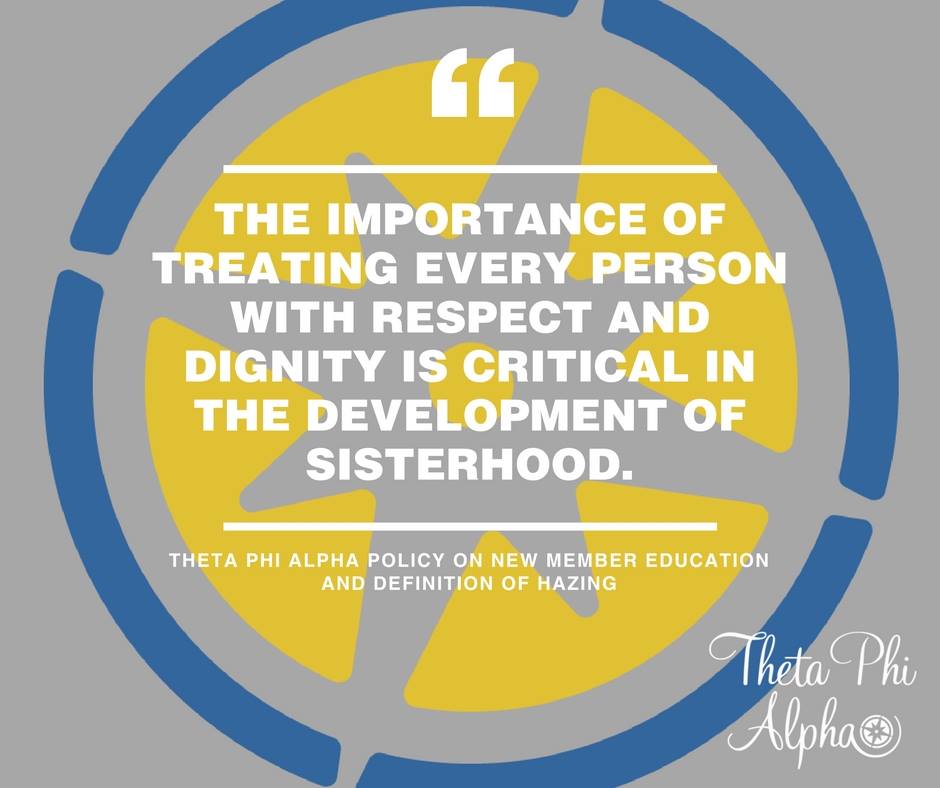 While National Hazing Prevention Week is recognized during the last full week of September, hazing prevention work should be an ongoing effort. Hazing is detrimental in any context, and it has no place in Theta Phi Alpha.
While National Hazing Prevention Week is recognized during the last full week of September, hazing prevention work should be an ongoing effort. Hazing is detrimental in any context, and it has no place in Theta Phi Alpha.
Why is hazing the topic of my blog? We pay attention to the things that we talk about.
As a values-based organization built on sisterhood, there is no place for hazing. Theta Phi Alpha endorses the NPC Resolution on hazing adopted in 1979 and reaffirmed in 1997 which defines hazing as follows: "[A]ny action or situation with or without consent that recklessly, intentionally or unintentionally endangers the mental or physical health or safety of a student, or creates risk of injury, or causes discomfort, embarrassment, harassment or ridicule or that willfully destroys or removes public or private property for the purpose of initiation or admission into or affiliation with, or as a condition for continued membership in, a chapter or colony (emerging chapter) of an NPC member fraternity."
Most states have anti-hazing laws which make it a criminal act to endanger another human being by hazing. Some of these state laws require us, as the national organization, to report hazing to the proper authorities. There is work at the federal level to enact similar laws. On June 13, 2019, Congressmen Marcia Fudge (D-OH) and G.T. Thompson (R-PA) introduced the END ALL Hazing bill in the House. Announcing the new bill in a House floor speech, Thompson said the "End All Hazing Act" aims to "eradicate hazing on college campuses."
 But as sisters, our motivation to prevent hazing should not come from organizational policies or federal legislation. As sisters, we should be committed to building relationships with one another from a place of respect and care for one another. To do this, it is important to continue an open and honest dialogue on hazing. If it feels like something that you can’t talk about, ask yourself why, and reach out to the National Office for help on how to start the conversation. (Suggested Article: Engaging Members in a Conversation About Hazing Prevention After a Membership Review by Dave Westol)
But as sisters, our motivation to prevent hazing should not come from organizational policies or federal legislation. As sisters, we should be committed to building relationships with one another from a place of respect and care for one another. To do this, it is important to continue an open and honest dialogue on hazing. If it feels like something that you can’t talk about, ask yourself why, and reach out to the National Office for help on how to start the conversation. (Suggested Article: Engaging Members in a Conversation About Hazing Prevention After a Membership Review by Dave Westol)
Would you be able to recognize hazing? Are you being forced to consume alcohol or any other substance, including foods? Are you being isolated from other people? Are you being required to stay awake, do menial tasks, physical labor or similar physical hardships? Are you being humiliated? These are some examples of hazing. If the activity makes you uncomfortable or you wouldn’t share the story with your parents/grandparents, then it may be hazing.
Why don’t more people speak up when they witness hazing? It is called the Bystander Effect. The Bystander Effect occurs when the presence of others discourages an individual from intervening in an emergency situation1. The more people that are present increases the likelihood that bystanders will not act. Please have the courage to act or report hazing. If you see hazing happening, say something. If you aren’t comfortable to say something to those who are actively hazing then report it to the national organization or to campus officials. If a life is in danger, please call emergency services.
Important Safety Reminders:
- If there is an immediate threat to bodily injury or concern of safety - dial 911.
- You can call 1-888-NOT-HAZE (1-888-668-4293). The anonymous telephone line is maintained by Fraternal Law who will forward any information to the proper National Office for further investigation.
- You may contact the National Office, (440) 899-9282, and speak with the Executive Director or Director of Collegiate Services. You may elect to remain anonymous.
Additional resources:
- https://hazingprevention.org
- https://zetataualpha.org/programs/my-sister-my-responsibility
- https://mjsorority.com/resources/library/
- https://www.psychologytoday.com/us/basics/bystander-effect